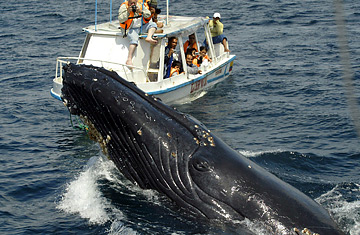
It’s a ritual that boils the blood of whale-watchers everywhere. On Nov. 18, a fleet of four Japanese vessels left Shimonoseki harbor in Western Japan to begin its five-month whale hunt in the Antarctic Ocean. This time, however, the whalers are planning what’s expected to be its largest hunt in decades; along with about 850 minke and 50 finback whales, the fleet says it plans to harpoon as many as 50 humpback whales for the first time since hunting the endangered species was banned in 1963.
The escalation of the hunt, and the inclusion of humpbacks, has drawn condemnation from leading anti-whaling countries, including Australia, New Zealand, Britain and the U.S. JAPANESE WHALERS WON’T SAY IF THEY’LL SPARE MIGALOO, screamed one Australian headline, referring to an albino humpback occasionally spotted off the Australian coast who has become a popular tourist attraction. With an upcoming general election, the issue has become heavily politicized in Australia; the opposition Labor party’s campaign platform includes a proposal to mobilize military aircraft to monitor Japanese whaling fleets. But Japan has said it needs to recommence hunting one of conservationists’ most beloved species to further marine research. “Whales are just as important, and no more special, than any other fish,” says Japan Fisheries Agency spokesperson Hideki Moronuki, maintaining Japan’s long-held position that marine mammals should get no special treatment for being warm-blooded. Japan maintains that with a population of around 40,000 growing at 15% a year, the formerly endangered humpback has recovered to a sustainable level for lethal research. Anti-whalers, on the other hand, simply see this as raw defiance. “They’re just doing this to show us that they can,” says Paul Watson, founder of the anti-whaling Sea Shepherd Conservation Society.
Under a loophole in the 1986 International Whaling Commission ban against commercial whaling, Japan has continued to kill hundreds of whales every year for scientific research. Once a whale is killed, scientists collect data from the animal’s remains on its age, birthing rate and diet; the meat is then packaged and sold. Japan maintains that the research is essential for managing the whale population. “Minke or humpback, we see whales as a marine resource,” says Moronuki. Still, most observers have long been skeptical of any benefits from the project. “I haven’t met one person, pro-whalers or not, outside of the Fisheries Agency payroll who believe that these researches are useful,” says Greenpeace Australia Pacific’s CEO Steve Shallhorn. Tensions have been heating up in recent hunts. In February, a member of Japan’s whaling fleet was killed in a ship fire following a series of confrontations with vessels from Sea Shepherd. Both Greenpeace and Sea Shepherd say that they are prepared to “chase, block, and harass” any attempts by the whaling fleet to harpoon humpbacks.
Japan has cited its long history as a whaling nation and its historic reliance on whale meat for protein as reasons why it should be continued to allow to hunt despite the IWC ban. But Japanese consumption has become so negligible that local governments are encouraging schools to incorporate whale in their lunch programs, while thousands of tons of whale meat remain stockpiled in freezers. The bigger issue, observers say, is whaling’s impact on far more popular forms of seafood. Japan, which consumes half of the world’s tuna catch, recently admitted to exceeding its quota for southern bluefin tuna set under an agreement with Australia and New Zealand, as overfishing threatens to decimate the animal’s population. Plunging global fish stocks, along with a growing taste for sushi in China and the West, make Japan very uneasy about its future access to fresh seafood. So holding a firm line on the sustainable harvesting of whales, the argument goes, can help stave off a larger fight over more important fishing rights down the road. Says Moronuki: “Our whaling culture is near extinction because of the moratorium on commercial whaling. We need to make sure this doesn’t happen to other marine resources.”